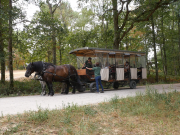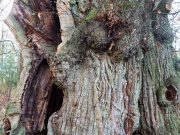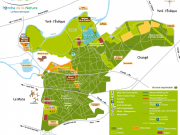L’Arche de La Nature (Le Mans, France): A forest for the many
A municipal forest (forêt communale) is a forest owned by a commune or territorial collectivity. There are around 11,000 municipalities that own a forest in France which represents in metropolitan France 2.9 million hectares (around 5% of the total of its surface). They are managed by foresters from the French forestry service, l’Office National des Forêts (ONF) hired by the communes and must abide by the Forest regime rules, ensuring a sustainable management of the forest. The French state gives a compensatory payment to partially pay for the management of those woodlands. The L’Arche de la Nature forest was first bought in 1974 by the Communauté Urbaine (CU) of Le Mans Metropole with the intention of enhancing local greenspaces for the community.
What they did
The L'Arche de la Nature forest was then extended in 1997 to improve visitors’ experience, as well as to prevent the construction of a golf course on a floodplain. They are now looking at buying the last remaining parts of adjacent derelict and available land. It is located in the South of Le Mans and sits within three different communes: Changé, Yvre-l’Evêque and Le Mans. L’Arche de la Nature is now a 450ha site with 300ha of forests. It is owned and managed by the CU of Le Mans, which encompasses 19 communes. Its competencies are planning, water, roads and cycle paths, waste and council houses. L’Arche de la Nature is also part of the European Network Europarc, which also includes the Loch Lomond & Trossachs forest park and the Cairngorms National Park.
Lessons Learned
Over the years, the area has become indispensable to the local population, as it welcomes 500,000 visitors per year, including 18,000 children from all the schools of the CU and beyond the region. This success is down to the almost unlimited amount of activities developed over the years to welcome the public. The site has three major pillars: la Maison de la forêt (the house of forest), la Maison de la prairie (the house of the meadow) and la Maison de l’eau (the house of water). They all welcome the public all year and offer multiple facilities such as a museum of forest, two cafés run by a social enterprise with local organic produce, an educational farm where people can see animals and learn about them as well an educational garden, an arboretum, and a trail of remarkable trees. The activities you can do – from barbecues, playing disc golf, walking, jogging, mountain biking, archery, orienteering, kayaking – are almost endless. It is also possible to rent extra all terrain wheels for wheelchair users to facilitate the use the forest tracks.
Every year, major outdoor events are organised and are now some of the key calendar highlights of the city, along with the famous 24-hour car race, such as the Woodland Festival, Apple Festival, and Easter Hunt. They all take place on Sundays and can draw up to 12,000 people over an afternoon. There is also a plethora of partnerships with local charities and media to organise 10k runs, concerts, and much more.
Despite the abundance of activities listed above, the atmosphere remains simple and convivial. The main objective is not to make it a commercial place but accesible to everyone. The cost of such a success represents less than 3% of the total budget (€476m) of the CU. Every new expense is validated by the Council of Le Mans Metropole. The advantage of having bought that land through Le Mans Metropole is that it benefits from an important communication network. Regularly, news and events are advertised through the post via brochures as well as street hoardings and on the tram. The transport network, as it is managed by the CU, is varied and is interconnected to encourage a better use of the area with a tram stop, multiple buses and secured cycle paths leading to it.
Further information
For more details of the L'Arche de la Nature municipal forest, watch the short video below, read the full version of the report, or you can visit their website.


